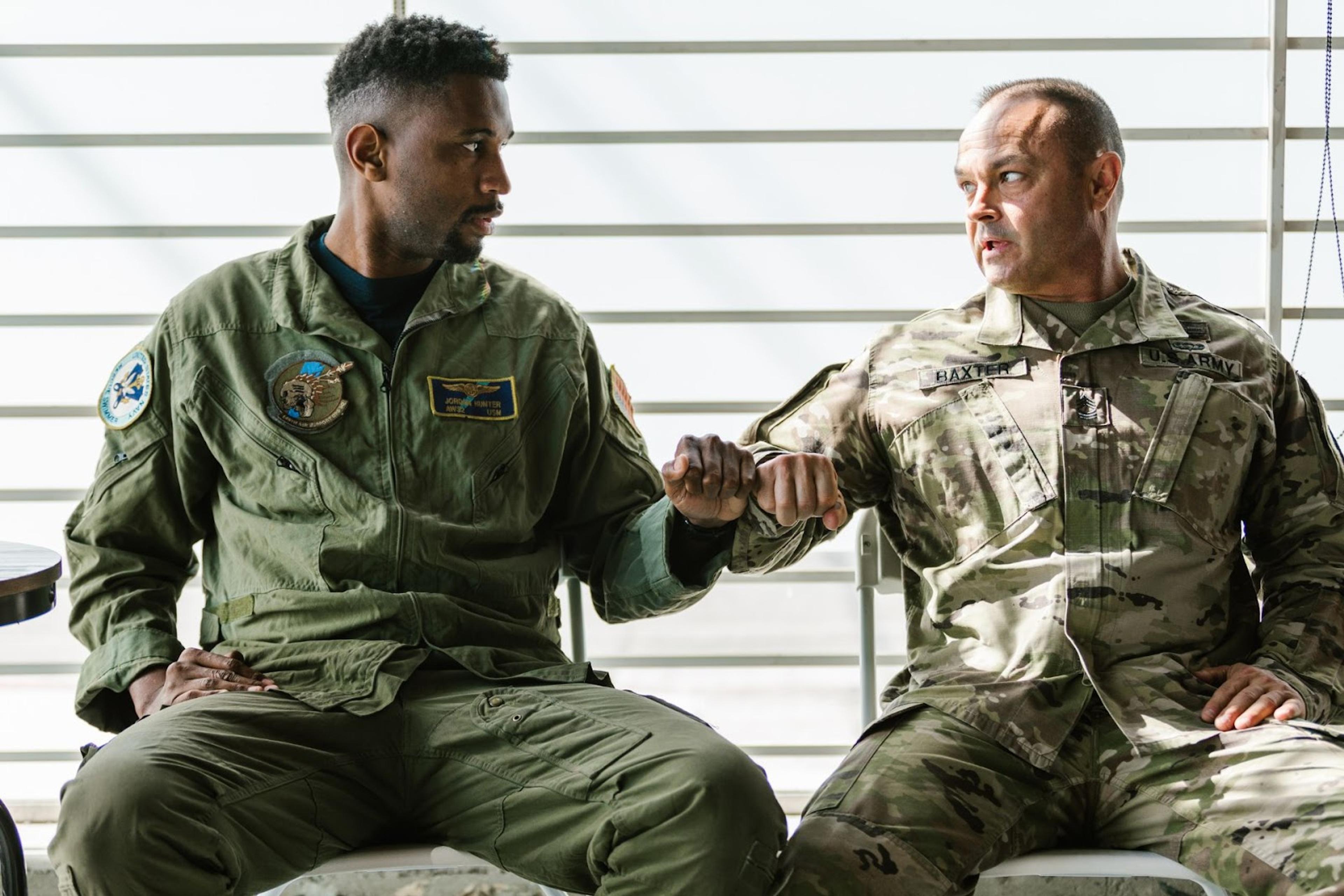
Table of Contents
Transitioning from a military career to the business world is a bold next mission. An MBA can be your launchpad. It’s more than just a degree: it’s a powerful way to translate years of leadership, discipline, and strategic thinking into high-impact roles in business, tech, finance, and beyond.
The right MBA program can sharpen your management skills, expand your business acumen, and unlock career paths that truly recognize the value of your service. In my own case, my MBA from Stanford completely changed the trajectory of my career, and I have many friends for whom the same is true.
Veterans bring a unique edge to business school, and many top MBA programs know it. From veteran fellowships and career support to full tuition through the GI Bill and Yellow Ribbon Program, there are more resources available than most realize. Unlike many of my classmates, I escaped business school debt free. In fact, I got paid to be there! So whether you're still on active duty, newly separated, or deep into civilian life, the opportunity is real – and well within reach.
As an MBA admissions coach, I specialize in getting veterans into their dream schools. Military applicants face the added challenge of translating their stories into language that resonates with the admissions committee. That’s where I help the most. I’m intimately familiar with the service to school transition because I’ve done it, gaining admission to my three target schools – Stanford, Berkeley, and MIT – all while still on deployment.
In this guide, I’ll break down the best MBA programs for veterans, how to navigate the admissions process, and how to make the most of military education benefits like the GI Bill and the Yellow Ribbon Program.
Read: Business School for Veterans: Everything You Need to Know
MBA for Veterans: Why Pursuing an MBA After Military Service Makes Sense
Veterans are some of the most well-prepared candidates for business school – many just don’t realize it yet.
Your military experience has already honed skills like strategic thinking, leadership under pressure, and operational excellence. Business schools value these qualities, and many offer tailored resources to help military students succeed.
Top reasons veterans pursue MBAs:
- Career Switching - Move into industries like consulting, tech, finance, or entrepreneurship.
- Business Expertise - Gain formal training in finance, marketing, operations, and strategy.
- Leadership Growth - Build on your military leadership foundation for C-suite roles.
- Networking - Join a diverse community of students, alumni, and employers committed to veteran success.
- Entrepreneurship - Use your business school experience to launch your own venture.
Many programs recognize the value veterans bring, offering admissions support, career services, and access to powerful veteran networks.
Read: Why Should You Get an MBA? An Expert Coach's Perspective
Top 12 Full Time MBA Programs for Veterans (GI Bill, Yellow Ribbon, and More Financial Aid Options)
Many MBA programs offer generous financial aid for veteran students, including:
- GI Bill - Covers tuition, fees, and provides a living stipend. Check eligibility with the Department of Veterans Affairs here.
- Yellow Ribbon Program - Schools voluntarily offer additional funding to cover costs above the GI Bill cap.
- Military Benefits - Some schools waive the application fee and offer dedicated scholarships for current veteran students and active military personnel.
Schools like Arizona State University, Carlson School, and top MBA programs nationwide proudly participate in Yellow Ribbon.
The following graduate programs stand out for their veteran support, strong career outcomes, and access to veteran services:
| School | Veteran Support & Financial Aid Options | Alumni Career Outcomes | Location |
|---|---|---|---|
| Harvard Business School | Offers up to $20,000 per year through the Yellow Ribbon Program, matched by the VA for a total of $40,000. | Harvard Business School graduates have a median base salary of $150,000, with 95% receiving job offers within three months of graduation. | Boston, MA |
| Stanford Graduate School of Business | Waives application fees for active-duty U.S. military service members and veterans. Participates in the Yellow Ribbon Program, matching up to full tuition and fees for eligible veterans. The Stanford GSB Veterans Club supports prospective military candidates as they navigate the admissions process. | Stanford MBA graduates have a median base salary of $160,000, with 91% receiving job offers within three months of graduation. | Stanford, CA |
| Wharton School (University of Pennsylvania) | The Wharton Veterans Club provides assistance with MBA program search, application mentorship, and personalized admissions advising. Through the GI Bill, Wharton offers up to $25,000. | Wharton MBA graduates have a median base salary of $150,000, with 93.5% receiving job offers within three months of graduation. | Philadelphia, PA |
| University of Chicago Booth School of Business | Offers application fee waivers to all veterans and active military candidates, and provides up to $30,000 in scholarships for veterans. | Booth MBA graduates have a median base salary of $155,000, with 96.4% receiving job offers within three months of graduation. | Chicago, IL |
| MIT Sloan School of Management | The MIT Sloan Veterans Club welcomes veterans of all branches and provides application mentorship as well as a supportive community. | MIT Sloan MBA graduates have a median base salary of $150,000, with 95.5% receiving job offers within three months of graduation. | Cambridge, MA |
| Kellogg School of Management (Northwestern University) | Offers up to $22,000 through the Yellow Ribbon Program, matched by the VA. | Kellogg MBA graduates have a median base salary of $150,000, with 95% receiving job offers within three months of graduation. | Evanston, IL |
| Columbia Business School | The Veterans Club supports military veterans through advocacy, skills development, and a robust network. Up to full tuition coverage. | Columbia MBA graduates have a median base salary of $150,000, with 94% receiving job offers within three months of graduation. | New York, NY |
| UC Berkeley Haas School of Business | The Haas Veterans Club focuses on supporting members transitioning from the military to the civilian sector and mentoring prospective military applicants. Haas funds up to 100% of fees. | Haas MBA graduates have a median base salary of $140,000, with 95% receiving job offers within three months of graduation. | Berkeley, CA |
| Michigan Ross School of Business | Draws from a $200 million fund to support veteran MBA students. Hosts a Military Preview Weekend to introduce veterans to the Ross community. | Ross MBA graduates have a median base salary of $150,000, with 95% receiving job offers within three months of graduation. | Ann Arbor, MI |
| Duke University's Fuqua School of Business | Contributes up to $18,000 through the GI Bill, matched by the VA. The Duke Armed Forces Association advises and assists transitioning service members on matters concerning the VA, GI Bill, and reserves. | Fuqua MBA graduates have a median base salary of $145,000, with 96% receiving job offers within three months of graduation. | Durham, NC |
| Arizona State University (W.P. Carey School of Business) | Participates in the Yellow Ribbon Program with no cap on the number of students. Provides an array of scholarships aimed at veterans, up to $30,000. Offers online options and strong military scholarships. | W.P. Carey MBA graduates have a median base salary of $100,000, with 90% receiving job offers within three months of graduation. | Tempe, AZ |
| Carlson School of Management (University of Minnesota) | Up to full tuition support, plus a housing stipend. Waives the application fee. | Carlson MBA graduates have a median base salary of $115,000, with 93% receiving job offers within three months of graduation. | Minneapolis, MN |
Important note: Always check the school’s current Yellow Ribbon policy — some cap awards annually on a first-come, first-served basis. Applying early maximizes your chances of full funding.
Read: Top 5 Factors to Consider When Choosing an MBA Program, and When to Get an MBA, When Not To – and How it Affects Your Chances of Getting In
How to Make the Most of Your Military Background in Applications
Applying as a military veteran? Here’s how to stand out in the admissions process:
Translate military achievements into business impact
Admissions committees are deeply impressed by leadership, but they often lack context for military titles or jargon. When presenting your background, frame your accomplishments in clear business terms. Quantify the size of teams you managed, the budgets you controlled, or the operational improvements you led.
For example, instead of saying you were a "platoon leader," explain that you led a team of 40 personnel, coordinated complex operations across multiple countries, and achieved a 98% mission success rate. Think like a consultant: show leadership, decision-making, and outcomes.
Demonstrate quantitative and analytical strengths
An MBA curriculum is data-heavy, and schools want proof you can handle rigorous coursework. Highlight any quantitative skills you developed through logistics management, operational planning, engineering, or budgeting roles. If your role involved optimizing resource allocation, running analytics, or making financial decisions under pressure, emphasize it.
If you lack recent academic exposure to finance or statistics, consider enrolling in a course like MBA Math or a business analytics certificate, and mention it in your application to show commitment and readiness.
Position your background as a strategic advantage
Frame your military service as a unique asset that will enhance classroom discussions, contribute to team projects, and bring a distinct leadership lens. Veterans add critical diversity to MBA programs, offering global perspectives, resilience under stress, and real-world leadership. Tie your experience to the school’s broader mission around leadership, innovation, or global impact. Show not just that you are different, but that your difference adds clear value to the school community.
Don’t fall into the trap of thinking that business schools care much about combat experience. I’ve had clients who were worried that their lack of combat experience might be a disqualifier, or that their combat experience made them a shoo in. In fact, many of my veteran classmates and clients actually came from non-combat arms specialties. Trust me, business and combat are really different, and the admissions committee understands this! If you do talk about your combat experience, make sure that it clearly relates to skills and attributes that will make you successful in the business world. For example, talk about how the military has given you experience with mentorship, managing international teams, solving complex logistical problems, or training new recruits.
Choose recommenders who can validate leadership and growth potential
Recommendations play a pivotal role in framing your candidacy through another’s eyes. Select recommenders who have directly observed your leadership, strategic thinking, adaptability, and drive. Ideally, one recommender should be a military supervisor who can explain your command experience, and another could be a civilian mentor, post-military employer, or business connection who can attest to your potential in a corporate environment.
For each recommender, write a short "recommender brief" summarizing your MBA goals and reminding them of your key strengths. This will help them write a more targeted letter. And don’t worry if your recommenders don’t know anything about business – one of my letter writers was a 20-year master sergeant who had been in the Army since he was 18! What matters is that they can speak to your character.
Read: MBA Requirements: What You Need to Apply (and What Top Programs Really Look For)
Online Options for Military Students
If you’re still on active duty, part of the National Guard, or balancing a full-time job, pursuing an online MBA program can be a strategic way to advance your education without putting your career or service obligations on hold.
Top online MBA programs for veterans include:
Arizona State University (W.P. Carey School of Business)
Arizona State consistently ranks among the top veteran-friendly universities and offers an AACSB-accredited online MBA that fully participates in the Yellow Ribbon Program. ASU accepts GI Bill funding, provides specialized veteran services, and has flexible start dates designed for active military schedules. The program can be completed in as little as 21 months.
University of Florida (Warrington College of Business)
UF’s Online MBA is ranked #1 among public universities by U.S. News & World Report and offers low in-state tuition rates that are accessible with the GI Bill. They also participate in the Yellow Ribbon Program for eligible veterans. The program emphasizes flexibility, offering one- and two-year tracks to accommodate military and civilian careers.
University of North Carolina (Kenan-Flagler Business School)
UNC’s MBA@UNC online program is top-ranked nationally and maintains the same faculty, curriculum, and degree requirements as the on-campus MBA. The school is highly supportive of veterans, accepts GI Bill and Yellow Ribbon benefits, and has a robust Veterans Association as well as an alumni network with strong ties to consulting, finance, and technology sectors.
Online options often feature:
- Online classes that are built for flexibility, allowing you to complete coursework asynchronously around deployments, travel, or work schedules.
- Access to career services remotely, including one-on-one coaching, résumé support, interview preparation, and networking opportunities designed for transitioning military students.
- Military-focused advising teams who understand the unique needs of military backgrounds and can assist with everything from credit transfers to accessing veteran services.
Many military-friendly schools offer fully accredited business administration degrees online that are identical in quality and prestige to their on-campus counterparts, with real support structures to help active military personnel, veteran students, and reserve personnel achieve a successful transition into the business world.
Read:
- Everything to Know About Online MBA Programs
- 15+ Affordable Online MBA Programs
- The 25 Best Online MBA Programs
Next Steps for Veterans Pursuing an MBA
Choosing the right MBA program can fast-track your transition from military service to the business world. With your proven skills, leadership, and work ethic, an MBA will only enhance your career trajectory.
When I applied to business school, I was still a Green Beret in the Army Special Forces. Without the guidance I received from a fellow Green Beret in his 2nd year at Stanford, my life wouldn’t be the same. He patiently shared his insights into the admissions process, offered candid feedback on my essays, and helped me craft an authentic story. Now, I use my deep knowledge of the MBA admissions process to try to help other veterans make the same transition.
View my profile and book a free intro call with me to turn your military experience into a compelling MBA application.
Related Articles for Further Reading
- MBA Essay Examples & Tips (From an AdCom)
- MBA Application Timeline: What to Do and When to Apply
- How to Ace the HBS MBA Interview
- A Comprehensive Guide to 3+3 JD Programs
- The 10 Best MBA Admissions Consultants
FAQs About MBA Programs for Veterans
Will the VA pay for an MBA?
- Yes, the U.S. Department of Veterans Affairs (VA) can cover the cost of an MBA through the Post-9/11 GI Bill or Yellow Ribbon Program. Eligibility and benefit levels depend on your service history, the school’s participation, and the program's cost.
Does being a veteran help with MBA admissions?
- Yes, being a veteran can strengthen your MBA application. Many top business schools value military leadership, discipline, and real-world experience. Veterans often bring unique perspectives that enrich the classroom and are actively recruited by MBA programs.
Will the military pay for MBA?
- Yes, active-duty service members and veterans may qualify for tuition assistance, the GI Bill, and programs like VetSuccess or Military Tuition Assistance. Some branches and private military-friendly universities also offer MBA-specific funding or scholarships.
Is an MBA worth it over 40?
- Yes, an MBA can still be highly valuable after 40, especially for career changers, entrepreneurs, or professionals aiming for leadership roles. While ROI timelines may differ, the network, skills, and credentials can offer long-term career and salary benefits.

Written by Ian
5.0
(43)
My life has been about testing my limits, whether through the physical and emotional rigor of the Army Special Forces, the relentless intellectual grind of academia, the spiritual intensity of Zen temples, or the fast-paced and hyper-competitive world Silicon Valley. Through those experiences, I've learned invaluable lessons about the power of the mind and what it takes to thrive in life and career. Most importantly, I've learned that while in some ways we're all so similar, in other ways we couldn't be more different. In the next stage of my career, I hope to share those lessons with others so that they can discover who they are and learn to live more satisfying and meaningful lives.
Ian has helped clients get into organizations like:
Stealth Startup
DoorDash
Cruise
Khosla Ventures












